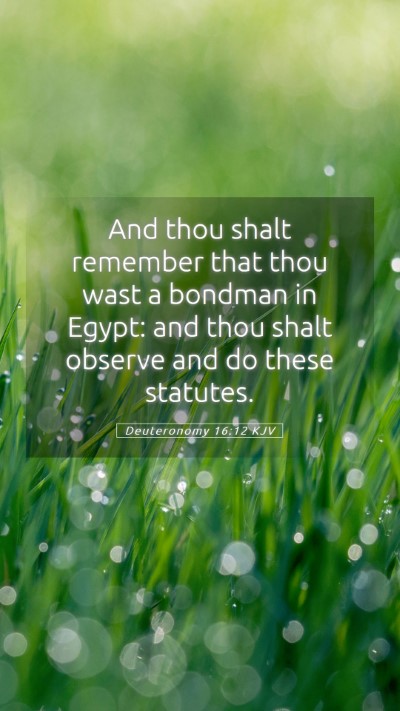Understanding Deuteronomy 16:12
Bible Verse: Deuteronomy 16:12 - "And you shall remember that you were a slave in Egypt, and you shall be careful to observe these statutes."
Overview
Deuteronomy 16:12 serves as a reminder of the Israelites' liberation from slavery in Egypt. It emphasizes the importance of observance of God’s laws through the lens of gratitude and remembrance of past suffering.
Contextual Background
This verse is part of a larger discourse where Moses instructs the Israelites to observe the appointed feasts as a means of commemorating their deliverance. The historical context of the Israelite's slavery in Egypt is central to their identity and faith.
Insights from Public Domain Commentaries
-
Matthew Henry's Commentary:
Henry underscores the importance of memory as a mechanism for cultivating gratitude and obedience. He suggests that by remembering their former bondage, the Israelites are motivated to observe God’s commandments with reverence, recognizing the mercy they have received.
-
Albert Barnes' Notes:
Barnes emphasizes the connection between divine law and human experience, noting that the remembrance of past afflictions serves not only as motivation for obedience but also as a foundation for future generations to understand God’s faithfulness and compassion.
-
Adam Clarke’s Commentary:
Clarke highlights the socio-religious implications of this verse, interpreting the command to remember as both a personal and communal obligation. He argues that the act of remembrance fosters unity among the Israelites and reinforces their national identity as a people delivered by God.
Key Themes
-
Remembrance:
The act of remembering serves as a powerful tool for spiritual growth and moral conduct.
-
Gratitude:
Acknowledging one’s past difficulties fosters an attitude of thankfulness and a desire to adhere to divine statutes.
-
Obedience:
True remembrance is demonstrated through obedience to God's laws and commandments.
Applications of the Verse
-
Personal Reflection:
Considering how one’s past struggles shape current obedience and faith choices.
-
Church Teachings:
Utilizing this verse to educate church communities about the link between history and faith, enhancing Bible study discussions.
-
Family Traditions:
Incorporating reminders of past hardships and God’s provisions into family worship and celebration practices.
Related Scripture References
- Exodus 20:2 - "I am the Lord your God, who brought you out of the land of Egypt, out of the house of bondage."
- Psalms 105:5 - "Remember His marvelous works, which He has done, His wonders, and the judgments of His mouth."
- Deuteronomy 5:15 - "And remember that you were a slave in the land of Egypt, and the Lord your God brought you out from there."
Conclusion
Deuteronomy 16:12 encourages believers to engage in a process of remembrance that enriches their spiritual lives and strengthens their commitment to God's commands. By understanding this scripture through various commentaries, individuals can gain a deeper appreciation for the significance of their faith journey and the necessity of obedience rooted in gratitude.


